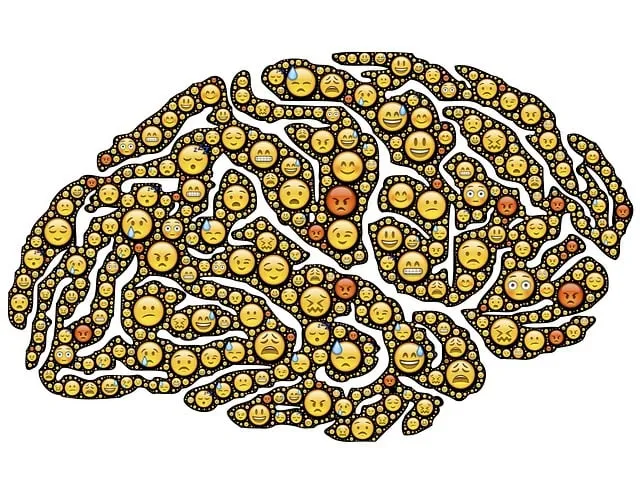Understanding mental health data requires a blend of qualitative insights and numerical analysis, with the Superior Kaiser Permanente mental health number as a key indicator of overall well-being. This data is crucial for identifying trends, evaluating programs, and personalizing interventions to cater to diverse needs. Through emotional intelligence and advanced analytics, healthcare professionals can develop journaling exercises and self-care routines that foster self-awareness, emotional regulation, and resilience. The Kaiser Permanente Mental Health Initiative leverages this data to enhance patient outcomes on a large scale by uncovering patterns in mental health disorders and effective treatment strategies. Normalization techniques, statistical modeling, and visualization tools simplify complex datasets, guiding proactive support strategies and personalized care. Future advancements include AI integration for deeper insights and targeted interventions.
Mental health data analysis is a powerful tool for understanding and improving global well-being. This comprehensive guide explores the intricacies of deciphering mental health information, highlighting notable initiatives like the Kaiser Permanente Mental Health Program. We delve into the unique techniques that contribute to their impressive Superior Kaiser Permanente mental health number, offering insights into effective strategies for data interpretation. From understanding datasets to practical implications, this article navigates the landscape of mental health analysis and its transformative potential.
- Understanding Mental Health Data: A Comprehensive Overview
- The Kaiser Permanente Mental Health Initiative
- Decoding the Superior Kaiser Permanente Mental Health Number
- Techniques for Effective Data Analysis and Interpretation
- Practical Implications and Future Directions in Mental Health Data Analysis
Understanding Mental Health Data: A Comprehensive Overview

Understanding mental health data involves a deep dive into a complex landscape of human experiences and behaviors. It requires comprehending not just numerical figures but also qualitative insights, such as emotional expressions, life events, and personal narratives. In the context of Kaiser Permanente, a leading healthcare provider, the superior mental health number—a metric tracking overall well-being—is more than just a statistic; it’s a snapshot of individual and community mental wellness. This data is crucial for identifying trends, evaluating programs, and tailoring interventions to meet diverse needs.
Emotional Intelligence plays a pivotal role in interpreting this data effectively. By analyzing patterns within the numbers, professionals can guide development of Mental Wellness Journaling Exercises and Self-Care Routine strategies. These tools empower individuals to take charge of their mental health by fostering self-awareness, regulating emotions, and cultivating resilience—all essential components for enhancing overall well-being.
The Kaiser Permanente Mental Health Initiative

The Kaiser Permanente Mental Health Initiative stands as a notable example of comprehensive mental health data analysis in action. This pioneering program leverages vast datasets to gain profound insights into psychological well-being, with a particular focus on anxiety relief, self-esteem improvement, and coping skills development. By analyzing trends and patterns within the superior Kaiser Permanente mental health number, researchers can identify at-risk populations and tailor interventions for maximum impact.
Through sophisticated statistical methods and cutting-edge technology, the initiative unearths valuable knowledge about mental health disorders, their prevalence, and effective treatment strategies. This data-driven approach enables healthcare providers to make informed decisions, personalize care plans, and ultimately enhance patient outcomes. By fostering a deeper understanding of mental health challenges, the Kaiser Permanente Mental Health Initiative is revolutionizing how we address and support psychological well-being on a large scale.
Decoding the Superior Kaiser Permanente Mental Health Number

The Superior Kaiser Permanente mental health number serves as a powerful indicator of an individual’s overall well-being. Decoding this number involves analyzing data collected through various assessments and surveys, offering a comprehensive view into one’s mental wellness. By examining factors such as stress levels, emotional state, coping mechanisms, and life satisfaction, healthcare professionals can gain valuable insights into the nuances of an individual’s mental health. This process goes beyond mere numbers, utilizing advanced analytics to identify patterns and trends that might otherwise remain unseen.
Guided by the Superior Kaiser Permanente mental health number, individuals can engage in activities like Mental Wellness Journaling Exercise and Self-Awareness Exercises, promoting positive thinking and proactive mental health management. These exercises encourage reflection on personal experiences, emotions, and thought processes, fostering a deeper understanding of one’s mental landscape. Ultimately, decoding this number acts as a catalyst for positive change, empowering individuals to take control of their mental wellness and pursue a more fulfilling life.
Techniques for Effective Data Analysis and Interpretation

Mental health data analysis requires a multifaceted approach to unearth meaningful insights and drive effective interventions. One powerful technique is normalisation, which standardises raw data, allowing for comparisons across different demographics and time periods. This method, especially when applied to the Superior Kaiser Permanente mental health numbers, can highlight trends and disparities in mental well-being. Additionally, statistical modelling enables researchers to predict outcomes and identify high-risk groups, paving the way for proactive support strategies.
Visualisation tools play a pivotal role in interpreting complex data. Graphs, charts, and infographics simplify vast datasets, making it easier to grasp patterns and correlations. For instance, visualisation can reveal connections between specific Stress Reduction Methods or Anxiety Relief techniques and improved mental health outcomes, reinforcing the value of Mind Over Matter Principles in treatment protocols.
Practical Implications and Future Directions in Mental Health Data Analysis

The analysis and interpretation of mental health data hold immense practical implications for healthcare providers and organizations like Kaiser Permanente. By leveraging superior data analytics techniques, mental health professionals can identify trends, predict outcomes, and tailor interventions to meet individual needs more effectively. This precision approach has the potential to significantly enhance patient care, improve treatment adherence, and ultimately contribute to better emotional well-being promotion techniques.
Looking ahead, future directions in mental health data analysis include integrating innovative technologies, such as AI and machine learning, to process vast amounts of data from various sources, including electronic health records and Mental Wellness Podcast Series production. This holistic view can provide deeper insights into the complex interplay between mental health conditions and other factors like lifestyle, environment, and social determinants of health. Additionally, trauma support services can be enhanced through data-driven strategies that identify at-risk populations and design targeted interventions, ensuring more effective care for those who have experienced traumatic events.
Mental health data analysis has evolved into a powerful tool, as evidenced by Kaiser Permanente’s successful initiative. Decoding the Superior Kaiser Permanente mental health number highlights effective techniques that can be adopted to interpret complex data and drive meaningful change. As we look towards the future, continued advancements in this field will foster better understanding, improved treatment strategies, and ultimately, enhanced well-being for individuals facing mental health challenges.






